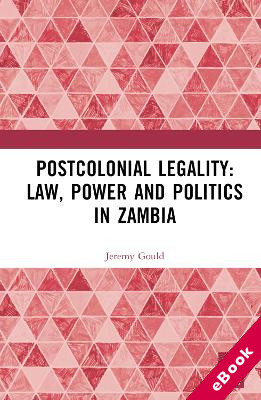
The device(s) you use to access the eBook content must be authorized with an Adobe ID before you download the product otherwise it will fail to register correctly.
For further information see https://www.wildy.com/ebook-formats
Once the order is confirmed an automated e-mail will be sent to you to allow you to download the eBook.
All eBooks are supplied firm sale and cannot be returned. If you believe there is a fault with your eBook then contact us on ebooks@wildy.com and we will help in resolving the issue. This does not affect your statutory rights.
This book interrogates the ideology and practices of liberal constitutionalism in the Zambian postcolony. The analysis focuses on the residual political and governmental effects of an imperial form of power, embodied in the person of the republican president, termed here prerogativism. Through systematic, long-term ethnographic engagement with Zambian constitutionalist activists – lawyers, judges and civic leaders – the study examines how prerogativism has shaped the postcolonial political landscape and limited the possibilities of constitutional liberalism. This is revealed in the ways that repeated efforts to reform the constitution have sidelined popular participation and thus failed to address the deep divide between a small elite stratum (from which the constitutional activists are drawn) and the marginalized masses of the population.
Along the way, the study documents the intimate interpenetration of political and legal action and examines how prerogativism delimits the political engagements of elite actors. Special attention is given to the reluctance of legal activists to engage with popular politics and to the conservative ethos that undermines efforts to pursue a jurisprudence of transformational constitutionalism in the findings of the Constitutional Court.
The work contributes to the rising interest in applying socio-legal analysis to the statutory domain in postcolonial jurisdictions. It offers a pioneering attempt to deconstruct the amorphous and ambivalent assemblage of ideas and practices related to constitutionalism through detailed ethnographic interrogation. It will appeal to scholars, students and practitioners with an interest in theorizing challenges to political liberalism in postcolonial contexts, as well as in rethinking the methodological toolbox of socio-legal analysis.
Jeremy Gould is Professor Emeritus of Development Studies, and an Adjunct Professor in Social and Cultural Anthropology based at the University of Helsinki, Finland.